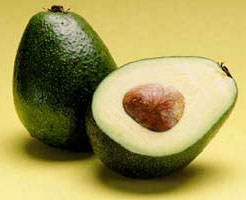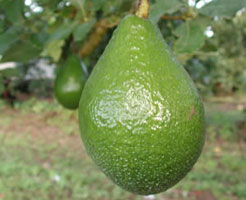Report any errors, problems, and inaccuracies, by clicking on the complaints box!
About 20% of Haitian avocados are being exported annually on an informal basis to the Dominican Republic, according to Agronomist Gilles Damais of the Institute for Researches and Application of Development Strategy.
This estimate is based on a study from the commercial channel of Haitian avocados being informally exported to the Dominican Republic. The research was done by the Institute for Researches and Application of Development Strategy from May to August 2005, within the Laboratory of Haitian-Dominican Relations (LAREHDO).
Haiti produces annually 50,000 tons of avocados and, from this production, 10,000 tons are exported to the Dominican Republic through trades done informally between the two countries, indicates Gilles Damais.
10,000 tons of Haitian Avocados Exported to the Dominican Republic
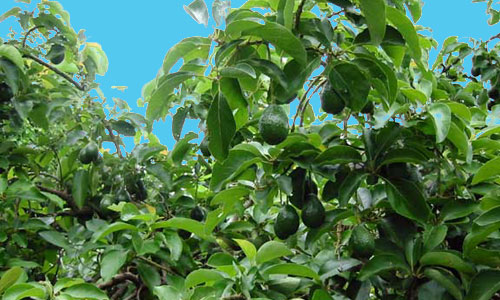
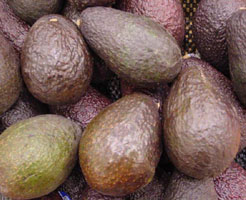
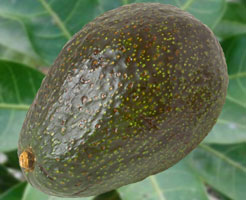
The sale is done between Haitian and Dominican brokers. The latters buy the avocados by set of 12 to resale them by the hundreds in the Dominican Republic at a higher profit, they said. The prices of Haitian avocados, around .05 cents a pound within the border, are very competitive, according to the study.
The Dominican Republic is better ranked than Haiti on the International market with an estimated production of 140,000 metric tons according to the Food and Agricultural Organization of United Nations (FAO 2004) and would be classified as the 6th world's producer of avocados. According to the same source, the average yield in the Dominican Republic reaches (more than 10 MT/ha) and would be the highest in the world and the plantations areas would be about 13,500 ha.
Based on his analyzis, Damais said however that the avocados imported from Haiti represent a significant part of the Dominican consumption of avocados. The 10 MT of imported avocados equate 8% of the Dominican consumption.
The researcher noted that the cheap rate of the major volumes of avocados imported by the DR contribute to maintain risen costs overthere toward a fast expansion of the trades.
For a competitive improvement of Haitian avocados, Gilles Damais pointed out 3 types of solution. We have to implement a plan in which we can identify the varieties of avocados in order to increase the production on the local and global market. Coffee cooperatives could within that capacity, get progressively involved in the packaging and marketing of Haitian avocados, along with Dominican contractors in this sector, added Damais.
He said that avocados' production should be particularly promoted (grafting, crop nursery, marketing support) in all mountainous and humid regions of Haiti, whether it's for the local market or for exports to the DR.
Avocado is cultivated in Haiti on almost all altitudes, starting from sea level up to approximately 6,560 feet. This is the result of the diverse varieties of avocados available in Haiti. There are the endogenous varieties called "West Indians" and the Central American ones from Guatemala.
This study shows also that the consumption of avocados per capita in Haiti has seriously declined. It was estimated in the 1970 - 80's at a fluctuating quantity of 10 to 15 kg, equal to 70 fruits/capita and per year depending on the size. Today, the consumption is reduced annually to 5 kg/capita because of the degradation of the environment and deforestation.

"We currently estimate the amount of avocados exported to be around 10,000 within the Haitian-Dominican border. This is equal to 2 - 3 times the volumes produced in a 4 years-period, Damais explained.
He states that the value of this trade would be approximately 1.5 to 2 million US dollars for the 2004-2005 period. These numbers rank avocados among the major exported crops of Haiti.
The avocados-trade along the Haitian-Dominican border took place in the "Forêt-des-Pins" and "Baptiste" areas in the beginning of the 90's, Damais said. He also added that the volume of avocados exported informally outnumbers the quantity of mangoes transported to the U.S.A. by the formal sector.
According to Gilles Damais, this trade mobilizes hundreds of Haitian businessmen, carriers, and workers along the border while the direct trade between Haitian producers and Dominican brokers is not sustained due to the fact that the selling point of avocados is located in the Dominican Republic.



GET ALSO 3 BRAND NEW POSTCARDS ON HAITI WHEN BUYING A DVD OR VIDEO HAITI'S HIDDEN TREASURES!!!
Cablevision Channel 18 Long Island on Friday at 8:00 PM, Saturday and Sunday at 3:00 PM
Comcast Cable Channel 27 New Jersey on Friday at 7:00 PM - Sat. at 2:00PM - Sun. at 5:00 PM
Comcast Cable Channel 64 Jersey City on Saturday at 4:00 PM,
UHF Channel 26 Brooklyn, Queens, Manhattan, Bronx, Long Island on Saturday at 8:00 PM
WITH BARBARA & VALERIO SAINT-LOUIS
© 2004 - 2005 • Haitian Treasures • All rights reserved.

